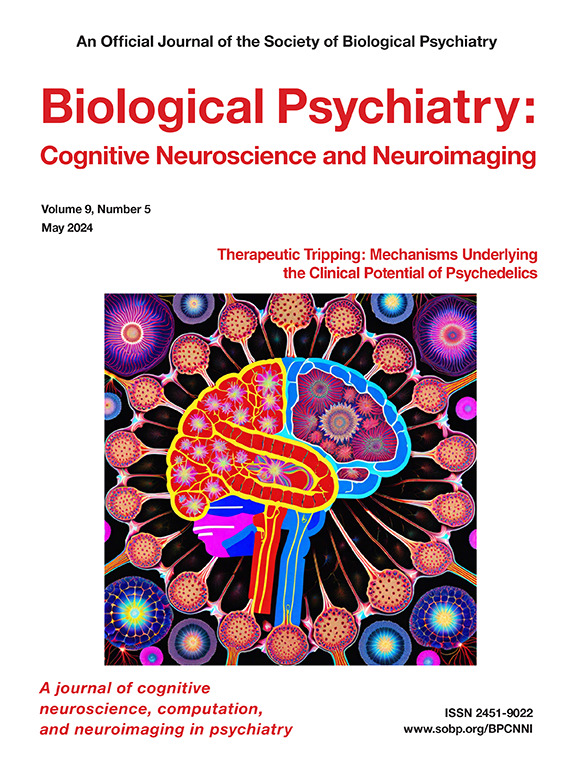Closed-Loop Systems and Real-Time Neurofeedback in Mindfulness Meditation Research
IF 5.7
2区 医学
Q1 NEUROSCIENCES
Biological Psychiatry-Cognitive Neuroscience and Neuroimaging
Pub Date : 2025-04-01
DOI:10.1016/j.bpsc.2024.10.012
引用次数: 0
Abstract
Mindfulness meditation has numerous purported benefits for psychological well-being; however, problems such as adherence to mindfulness tasks, quality of mindfulness sessions, or dosage of mindfulness interventions may hinder individuals from accessing the purported benefits of mindfulness. Methodologies including closed-loop systems and real-time neurofeedback may provide tools to help bolster success in mindfulness task performance, titrate the exposure to mindfulness interventions, or improve engagement with mindfulness sessions. In this review, we explore the use of closed-loop systems and real-time neurofeedback to influence, augment, or promote mindfulness interventions. Various closed-loop neurofeedback signals from functional magnetic resonance imaging and electroencephalography have been used to provide subjective correlates of mindfulness states including functional magnetic resonance imaging region-of-interest–based signals (e.g., posterior cingulate cortex), functional magnetic resonance imaging network-based signals (e.g., default mode network, central executive network, salience network), and electroencephalography spectral-based signals (e.g., alpha, theta, and gamma bands). Past research has focused on how successful interventions have aligned with the subjective mindfulness meditation experience. Future research may pivot toward using appropriate control conditions (e.g., mindfulness only or sham neurofeedback) to quantify the effects of closed-loop systems and neurofeedback-guided mindfulness meditation in improving cognition and well-being.
正念冥想研究中的闭环系统和实时神经反馈。
正念冥想据称对心理健康有诸多益处,然而,正念任务的坚持性、正念课程的质量或正念干预的剂量等问题可能会阻碍人们获得正念所带来的益处。包括闭环系统和实时神经反馈在内的方法可以提供一些工具,帮助提高正念任务的成功率、调整正念干预的剂量或提高正念课程的参与度。本综述探讨了如何利用闭环系统和实时神经反馈来影响、增强或促进正念干预。来自功能磁共振成像(fMRI)和脑电图(EEG)的各种闭环神经反馈信号已被用于提供正念状态的主观相关性,包括:基于兴趣区域的fMRI信号(如后扣带回皮层)、基于fMRI网络的信号(如默认模式网络、中央执行网络、显著性网络)和基于频谱的EEG信号(如α、θ和γ波段)。过去的研究侧重于成功的干预措施如何与主观正念冥想体验相一致。未来的研究可能会转向使用适当的对照条件(例如,仅正念或假神经反馈)来量化闭环系统和神经反馈引导的正念冥想在改善认知和健康方面的效果。
本文章由计算机程序翻译,如有差异,请以英文原文为准。
求助全文
约1分钟内获得全文
求助全文
来源期刊

Biological Psychiatry-Cognitive Neuroscience and Neuroimaging
Neuroscience-Biological Psychiatry
CiteScore
10.40
自引率
1.70%
发文量
247
审稿时长
30 days
期刊介绍:
Biological Psychiatry: Cognitive Neuroscience and Neuroimaging is an official journal of the Society for Biological Psychiatry, whose purpose is to promote excellence in scientific research and education in fields that investigate the nature, causes, mechanisms, and treatments of disorders of thought, emotion, or behavior. In accord with this mission, this peer-reviewed, rapid-publication, international journal focuses on studies using the tools and constructs of cognitive neuroscience, including the full range of non-invasive neuroimaging and human extra- and intracranial physiological recording methodologies. It publishes both basic and clinical studies, including those that incorporate genetic data, pharmacological challenges, and computational modeling approaches. The journal publishes novel results of original research which represent an important new lead or significant impact on the field. Reviews and commentaries that focus on topics of current research and interest are also encouraged.
 求助内容:
求助内容: 应助结果提醒方式:
应助结果提醒方式:


